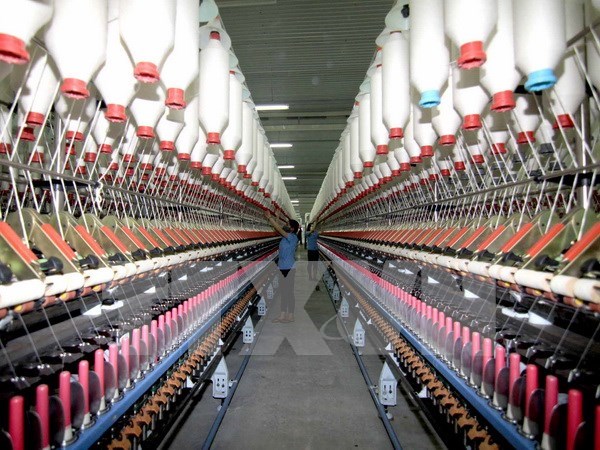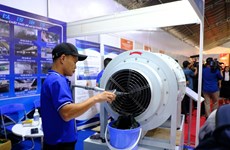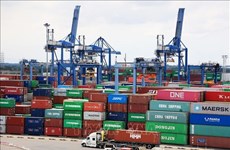Policy forum talks TPP, EU – Vietnam FTA
A trade policy forum was held in Hanoi on January 22 with a focus on the Trans-Pacific Partnership (TPP), the EU – Vietnam Free Trade Agreement and their impacts on Vietnamese small and medium firms.
 A fibre production line of the Vietnam National Textile and Garment Group (Photo: VNA)
A fibre production line of the Vietnam National Textile and Garment Group (Photo: VNA)Hanoi (VNA) – A trade policy forum was held in Hanoi on January 22 with a focus on the Trans-Pacific Partnership (TPP), the EU – Vietnam Free Trade Agreement (EVFTA) and their impacts on Vietnamese small- and medium-sized enterprises (SMEs).
The TPP will have strong influence on Vietnam’s economy once it takes effect, according to the Ministry of Industry and Trade’s Trade Promotion Agency. The country’s GDP could expand by 11 percent while exports will rise 28 percent by 2025. The overseas shipments of key commodities like textile-garment, leather and footwear, and aquatic products will also increase sharply in the next decade.
The EVFTA will eliminate 99 percent of import tariffs on Vietnamese goods in the EU and vice versa after seven to 10 years. It is expected to raise Vietnam’s and the EU’s export revenue by 4 – 6 percent annually compared to the prior-EVFTA period.
The two trade deals will also pose major challenges to State agencies and businesses in addition to potential massive economic benefits.
Strong tariff cuts will trigger an influx of foreign goods with lower prices. It means domestic companies are facing fierce competition while their products must satisfy stringent rules of origin, and they have to prepare for issues regarding dumping, subsidies and trade remedies.
Economist Pham Chi Lan said Vietnamese SMEs will benefit much from the EVFTA thanks to better trade liberisation and regional connectivity, an expanded global value chain and optimised competitive edges.
While tariff barriers against almost all export commodities will be removed, import expenses will be reduced and supply sources - especially of technology and intermediate equipment and products, will become more diverse. Vietnamese firms will also profit from a fairer business climate both at home and abroad, a more robust market economy mechanism, and better investor protection, she noted.
Claudio Dordi , Chief Advisor of the European Trade Policy and Investment Support Project (EU - MUTRAP), suggested Vietnamese businesses pay heed to rules of origin of textile and garment products – a big foreign currency earner, and comply with international technical and hygiene standards, especially those of the EU.
The EU is not the only market and Vietnamese companies should seek other related export destinations, he added.
Dordi also told the country to provide its enterprises with details about the EVFTA and other trade pacts. Meanwhile, national and local strategies need to be designed to assess geographical indications and develop recognisable brands to fuel overseas shipments.-VNA













